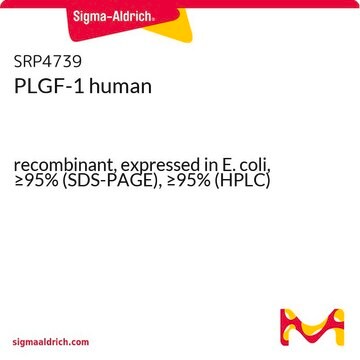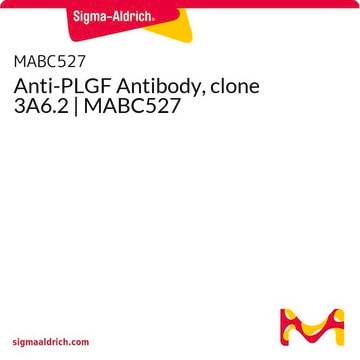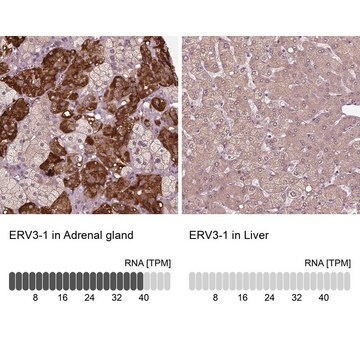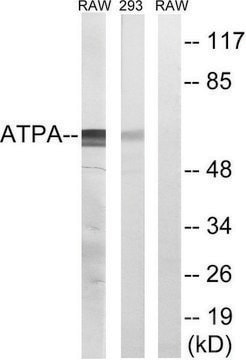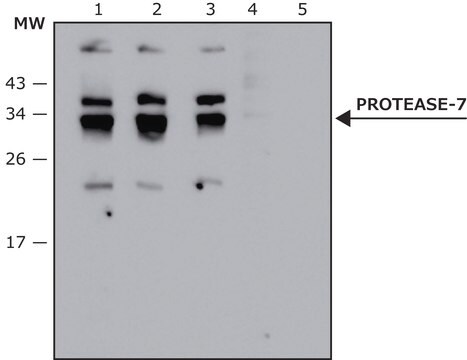SRP4743
PLGF from mouse
recombinant, expressed in E. coli, ≥95% (SDS-PAGE), ≥95% (HPLC)
Synonim(y):
PGF, PIGF
Zaloguj sięWyświetlanie cen organizacyjnych i kontraktowych
About This Item
Polecane produkty
pochodzenie biologiczne
mouse
rekombinowane
expressed in E. coli
Próba
≥95% (HPLC)
≥95% (SDS-PAGE)
Postać
lyophilized
masa cząsteczkowa
~32.6 kDa
opakowanie
pkg of 10 μg
warunki przechowywania
avoid repeated freeze/thaw cycles
zanieczyszczenia
endotoxin, tested
numer dostępu NCBI
Warunki transportu
wet ice
temp. przechowywania
−20°C
informacje o genach
mouse ... Pgf(18654)
Opis ogólny
PLGF (also called Placenta Growth Factor, PIGF, PGF) is an angiogenic factor that belongs to the cysteine-knot superfamily of growth factors. PLGF is expressed in placental tissues, colon and mammary carcinomas. It signals through the VEGFR-1/FLT1 receptor and stimulates endothelial cell proliferation and migration. Recombinant mouse PLGF is a disulfide-linked homodimer containing two 142 amino acid polypeptide chains.
Postać fizyczna
Sterile filtered and lyophilized with no additives.
Rekonstytucja
Centrifuge the vial prior to opening. Avoid freeze-thaw cycles.
Reconstitute the protein in sterile 20 mM acetic acid to a concentration of 0.1-1.0 ug/ul. The solution can then be diluted into other aqueous buffer.
This page may contain text that has been machine translated.
Kod klasy składowania
11 - Combustible Solids
Klasa zagrożenia wodnego (WGK)
WGK 3
Temperatura zapłonu (°F)
Not applicable
Temperatura zapłonu (°C)
Not applicable
Certyfikaty analizy (CoA)
Poszukaj Certyfikaty analizy (CoA), wpisując numer partii/serii produktów. Numery serii i partii można znaleźć na etykiecie produktu po słowach „seria” lub „partia”.
Masz już ten produkt?
Dokumenty związane z niedawno zakupionymi produktami zostały zamieszczone w Bibliotece dokumentów.
Changjun He et al.
Cellular physiology and biochemistry : international journal of experimental cellular physiology, biochemistry, and pharmacology, 47(6), 2534-2543 (2018-07-11)
Assistance with tumor-associated vascularization is needed for the growth and invasion of non-small cell lung cancer (NSCLC). Recently, it was shown that placental growth factor (PLGF) expressed by NSCLC cells had a critical role in promoting the metastasis of NSCLC
Zanfeng Wang et al.
Molecular and cellular biochemistry, 439(1-2), 163-169 (2017-09-02)
Vascular endothelial growth factor (VEGF) family members play critical and complex roles in the regulation of cancer vascularization and metastasis. The exact molecular control of lung cancer metastasis by VEGF family members is not completely understood. Here, we showed that
Huaifeng Li et al.
Cancer science, 109(5), 1532-1544 (2018-03-27)
Gallbladder cancer (GBC) is the most common malignant tumor of the biliary tract system. Epithelial-mesenchymal transition (EMT) plays a vital role in the process of tumor metastasis. Mesenchymal-like cells can serve as a source of cancer stem cells, which can
Xu Zhou et al.
Scientific reports, 5, 10071-10071 (2015-05-12)
Cancer neovascularization plays an essential role in the metastasis of larynx carcinoma (LC). However, the underlying molecular mechanisms are not completely understood. Recently, we reported that placental growth factor (PLGF) regulates expression of matrix metalloproteinase 3 (MMP3) through ERK/MAPK signaling
Nasz zespół naukowców ma doświadczenie we wszystkich obszarach badań, w tym w naukach przyrodniczych, materiałoznawstwie, syntezie chemicznej, chromatografii, analityce i wielu innych dziedzinach.
Skontaktuj się z zespołem ds. pomocy technicznej